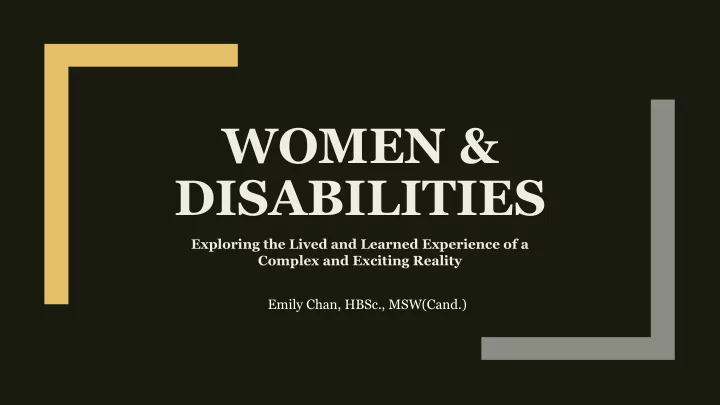

WOMEN & DISABILITIES Exploring the Lived and Learned Experience of a Complex and Exciting Reality Emily Chan, HBSc., MSW(Cand.)
Workshop Outline ■ Icebreaker Activity ■ Key Concepts Introduction ■ Some Statistics ■ Examination of Lived Realities of WwD ■ Small Group Activity + Discussion ■ Wrap-Up ■ Q&A
Brainstorm what comes to mind when you hear wome men and disa sabi biliti lities Icebreaker Jot down 1-2 ideas on your sticky notes and share with your Activity table groups We will return to this at the end
Key Concepts Intersectionality Life-Course Perspective
Intersectionality ■ “A theoretical framework for understanding how multiple forms of inequality compound to create unique models of discrimination” (Crenshaw, 1991)
Life Course Perspective ■ “ Life course theory refers to a multidisciplinary paradigm for the study of people's lives, structural contexts, and social change.” (Elder, Johnson, & Crosnoe, 2003)
Some Statistics ■ In 2012, 2.7 mil illion ion Canadian women reported having one or more disabilities ■ Most common types of disabilities reported include – 11.2% → pain-related – 8.5% → flexibility related – 8.2% → mobility related (Statistics Canada, 2017)
Statistics (cont.) ■ Women with disabilities are HALF F as likely to obtain a bachelor’s degree or higher compared to their non-disabled counterparts ■ Nearly HALF of women with disabilities feel disadvantaged in employment due to their condition ■ Only 61% of women with disabilities engage in workforce participation (Statistics Canada, 2017)
Childhood Adolescence Adulthood
Access to education/accommodations Childhood Stigma and discrimination Navigating and comprehending differences from typically developing peers
Adolescence Self-Confidence/Body Positivity Stigma, Discrimination, & Patronizing Attitudes Sexual Health Conversations
LACK OF EMPLOYMENT DISCRIMINATION IN HEALTHY OPPORTUNITIES THE WORKFORCE RELATIONSHIPS Adulthood CHILDBEARING & ESTABLISHING PARENTING PHYSICAL AND PSYCHOSOCIAL INDEPENDENCE
What can you do in your personal social location to address these issues (i.e., as a parent, employer, friend, ally) Small Group Activity Write down your ideas on the chart paper and share as a large group
Listen Empathize Wrap Up Support
Q&A
THANK YOU! emilychan3388@hotmail.com https://www.linkedin.com/in/emilychan-/
Recommend
More recommend